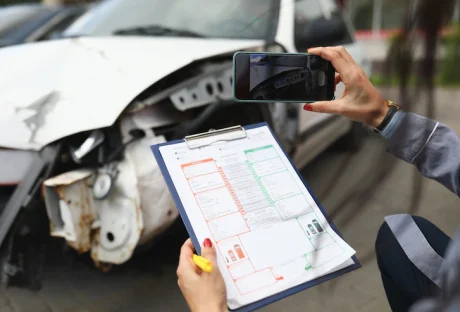Countless individuals like you daily navigate the bustling streets and highways in their cars. It’s a routine part of people’s lives, whether commuting to work, visiting loved ones, or running errands. However, amid the convenience and familiarity of the daily drives lies a substantial responsibility—car accident liability. Understanding this intricate topic is essential for all road users.
In the unfortunate event of a collision, determining liability can be challenging, often necessitating legal expertise, like a car accident lawyer in Winston Salem. This article aims to shed light on car accident liability, exploring its complexities and the vital role professionals like Winston-Salem car accident lawyers play in resolving these matters.
The Basics Of Car Accident Liability
At its core, car accident liability determines responsibility when a traffic accident occurs. This responsibility isn’t always immediately clear-cut and often involves multiple parties. For instance, envision a scenario where two vehicles collide at an intersection, and both drivers claim they had the green light.
In such cases, authorities must conduct thorough investigations, analyze evidence, and potentially rely on eyewitness accounts to ascertain which party should be held accountable for the accident. If you find yourself in a legal situation related to a car accident, seeking advice from a specialized professional, such as a *DUI lawyer in Phoenix*, can offer valuable insights tailored to your case.
Types Of Car Accident Liability
Car accident liability can be categorized into different types, each governed by its own set of regulations:
No-Fault Liability: In select states, the “no-fault” system prevails. This means that irrespective of who caused the accident, each driver’s insurance covers their medical expenses and vehicle damage. The rationale behind this system is to expedite claims processing and minimize the number of lawsuits stemming from minor accidents.
Comparative Fault Liability: In states that adhere to comparative fault rules, liability is assigned based on the percentage of fault attributable to each involved driver. For instance, if one driver is determined to be 80% responsible for an accident while the other bears 20% of the blame, compensation is allocated accordingly, reflecting these proportions.
Contributory Negligence Liability: Some states still follow the stringent doctrine of contributory negligence. Here, even a minor degree of fault on your part can result in being barred from seeking any compensation. It’s an all-or-nothing approach, which places a significant burden on drivers.
Proving Liability
Establishing liability in a car accident case necessitates collecting and presenting compelling evidence. Various types of evidence can be employed:
Witness Statements: Eyewitness accounts are often invaluable in reconstructing the accident’s sequence of events. Their statements can provide critical insights into who was at fault.
Police Reports: Police officers who respond to accident scenes generate official reports documenting observations and assessments. These reports carry substantial weight in determining liability.
Photographs and Videos: In the age of smartphones, the practice of capturing accident scenes on camera has become commonplace. Visual evidence like photographs and videos can be highly persuasive when establishing liability, providing a clear and objective record of the accident’s aftermath.
Insurance And Car Accident Liability
Insurance plays a pivotal role in the realm of car accident liability. While insurance offers protection for drivers, it can also pose challenges:
On one hand, insurance is a safety net that guards against financial devastation in the wake of an accident. It ensures that medical bills are covered, and vehicle repairs are financed.
On the other hand, insurance companies often aim to minimize their payouts. This may lead to disputes and legal proceedings between the involved parties as they navigate the intricacies of liability determination.
Legal Consequences Of Car Accident Liability
Once liability is established, legal consequences follow. These consequences can manifest in both civil and criminal forms, contingent upon the accident’s circumstances:
Civil Consequences: In civil cases, the injured party can file a lawsuit seeking compensation for various losses. This compensation includes medical expenses, property damage, pain, and suffering. When the court decides on liability, it may order the at-fault party to provide financial restitution.
Criminal Consequences: In extreme negligence or recklessness, the at-fault driver may face criminal charges. If you’re facing legal charges, it’s essential to understand the severity of the situation. These charges may range anywhere from misdemeanors to felonies and carry heavy penalties, such as fines, license suspension, or even imprisonment. Taking the necessary steps to protect your rights and defend yourself against these charges is crucial. Criminal proceedings are initiated and prosecuted by the state.
Mitigating Car Accident Liability
While accidents can happen to even the most cautious drivers, several strategies can help reduce liability:
Safe Driving Practices: Adhering to traffic laws, minimizing distractions, and maintaining vigilance while driving are effective ways to reduce the risk of accidents. Responsible driving habits can significantly decrease the likelihood of being held liable in the event of a collision.
Maintain Insurance: Ensuring adequate insurance coverage is fundamental in mitigating liability. Good coverage can provide financial protection in an accident, helping shield personal assets from the economic consequences of a collision.
Seek Legal Advice: When liability is ambiguous or disputed, consulting with an attorney specializing in personal injury law is wise. Legal professionals can guide the complex process of determining liability and pursuing compensation.
Conclusion
In car accidents, the repercussions of liability stretch far beyond the accident scene. They can impact finances, livelihoods, and personal well-being. This is where professionals like car accident lawyers in Winston-Salem become invaluable. They navigate the intricate web of car accident liability. Thereby ensuring justice is served and rightful compensation is obtained.
So, as you hit the roadways in your vehicle, remember the profound importance of car accident liability. It’s not just legal jargon but a fundamental aspect of responsible driving. In times of uncertainty, when accidents occur, you can rely on experts like Winston Salem car accident lawyers to guide you through the intricate process, providing you with the support and expertise needed to protect your rights and interests. Stay safe on the road, and always drive responsibly, for life’s journey is precious, and understanding liability ensures that we all arrive safely at our destinations.























